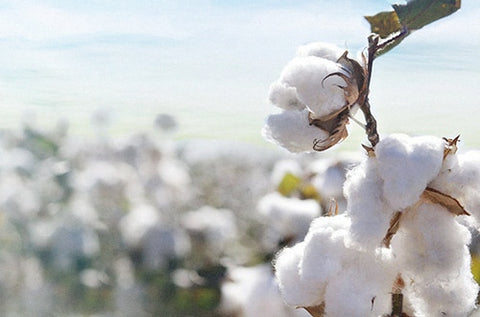
The earth laughs in flowers. - Ralph Waldo Emerson
Organic cotton is a natural, eco-friendly fiber grown without the use of synthetic pesticides, harmful fertilizers, or genetically modified organisms (GMOs). It is cultivated using methods that prioritize environmental health, biodiversity, and the well-being of farmers and communities.
Key Features of Organic Cotton:
-
Chemical-Free Farming
- No synthetic pesticides, herbicides, or fertilizers are used.
- Relies on natural techniques like crop rotation and composting to enrich the soil.
-
Non-GMO Seeds
- Grown from seeds that have not been genetically modified, preserving the natural integrity of the crop.
-
Sustainable Water Use
- Uses significantly less water than conventional cotton, thanks to healthier soil that retains moisture better.
-
Handpicked for Quality
- Often harvested by hand, preserving the purity of the fibers and reducing damage caused by machinery.
Why is Organic Cotton Important?
- Healthier for Skin:
- Free from harsh chemicals, making it gentle on sensitive skin and ideal for babies and those with allergies.
- Better for Farmers:
- Protects farmers from exposure to toxic chemicals, improving their health and working conditions.
-
Environmentally Friendly:
- Promotes healthy soil and reduces water pollution.
- Supports biodiversity by avoiding harmful chemicals and monocropping.
- Durable and Soft:
- Produces high-quality, long-lasting, and ultra-soft textiles.

Why choose Organic Cotton for clothing?
When it comes to clothing, the fabric you wear matters—for your comfort, your health, and the planet. Organic cotton is a game-changer, and here’s why:
1. Gentle on Your SkinOrganic cotton is free from harsh chemicals, synthetic pesticides, and toxic dyes, making it perfect for even the most sensitive skin. Its natural softness provides unmatched comfort, making it a healthier and more luxurious choice for everyday wear.
2. Better for the PlanetConventional cotton farming is resource-intensive and pollutes ecosystems. Organic cotton clothing, however:
- Uses less water and avoids toxic runoff.
- Protects soil health, promoting biodiversity.
- Reduces carbon emissions by using sustainable farming practices.
When you wear organic cotton, you’re reducing your environmental footprint while supporting a cleaner, greener planet.
3. Ethically MadeOrganic cotton production often prioritizes fair trade and ethical labor practices. This means safer working conditions, fair wages, and healthier lives for the farmers and workers who bring your clothes to life.
4. High-Quality and DurableOrganic cotton fibers are stronger because they aren’t exposed to harsh chemicals during production. This results in clothing that lasts longer, stays softer, and feels better over time—less waste, more value.
5. Support a Sustainable FutureWhen you choose organic cotton, you’re joining a movement toward sustainable fashion. It’s a choice that supports responsible brands, respects the planet, and contributes to a better future for all.
Comfort for you, care for the planet, and kindness to others—organic cotton clothing is a simple way to make a big impact.

Why Choose Organic Cotton Clothing & Toys for Babies?
Babies have delicate skin and unique needs, making organic cotton the perfect choice for their clothing and essentials. Here’s why:
1. Gentle on Sensitive SkinOrganic cotton is grown without harmful chemicals, synthetic pesticides, or toxic dyes. This makes it incredibly soft and safe, reducing the risk of irritation, rashes, and allergies. For a baby’s sensitive and developing skin, organic cotton provides the comfort and care they deserve.
2. HypoallergenicUnlike conventional cotton, organic cotton is processed without harsh treatments. This hypoallergenic quality ensures that your baby’s clothes, blankets, and bedding are free from irritants, creating a soothing and nurturing environment.
3. Breathable and ComfortableOrganic cotton is naturally breathable, helping to regulate your baby’s body temperature. It keeps them cool in summer and cozy in winter, ensuring year-round comfort without synthetic fibers or chemicals.
4. Free from Harmful ChemicalsBabies often explore the world with their mouths, and their clothes and bedding are no exception. Organic cotton is free from pesticides, formaldehyde, and other harmful substances, giving you peace of mind about what touches your baby’s skin.
5. Better for the Planet, Better for Their FutureOrganic cotton farming uses fewer natural resources and avoids polluting ecosystems. By choosing organic cotton for your baby, you’re contributing to a healthier planet for their future, preserving clean water, healthy soil, and a thriving environment.
6. Durable and Long-LastingOrganic cotton is stronger and more resilient, which means baby clothes and essentials last longer, even with frequent washes. Durable, high-quality fabric means less waste and more value.
7. Ethical and SafeChoosing organic cotton supports fair trade practices and ethical production, ensuring farmers and workers are treated with respect and fairness. When you buy organic, you’re fostering a better world for all children.
Nurture your baby naturally with the unmatched softness, safety, and sustainability of organic cotton. Because nothing is more important than your baby’s comfort, health, and future.
